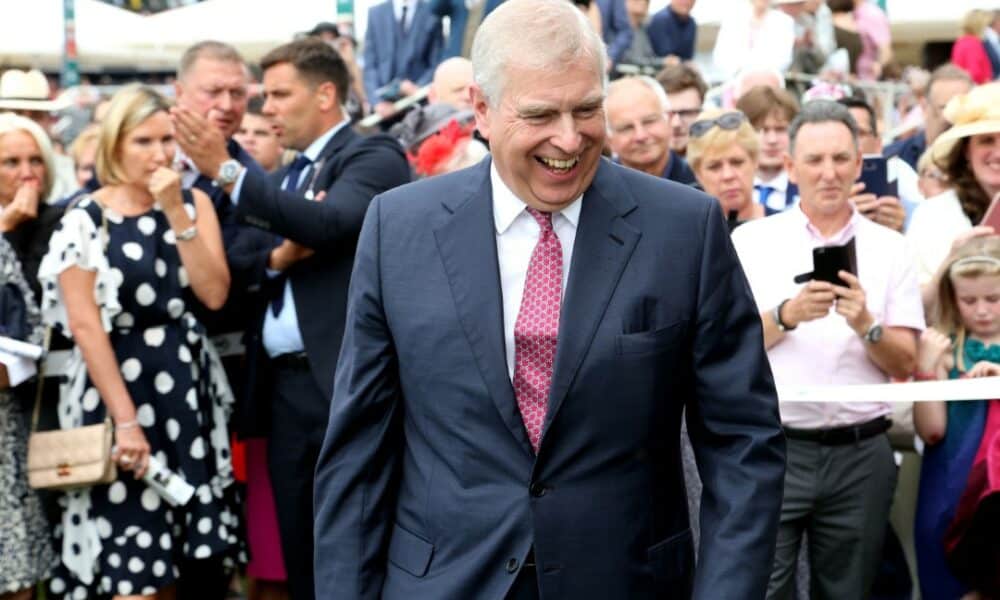Newly released documents have unveiled a close relationship between Prince Andrew and Yang Tengbo, an alleged Chinese spy, during a tumultuous period following the duke’s infamous 2019 BBC Newsnight interview. The papers, made public after media pressure, expose how Andrew maintained a direct communication channel with Chinese President Xi Jinping, sending annual birthday letters and pursuing business ventures in China with Tengbo’s assistance. Dominic Hampshire, Andrew’s former aide, described Tengbo as the duke’s “only light at the end of the tunnel” amid a deepening isolation within the royal family after the Epstein scandal. The investigation, led by the Special Immigration Appeals Commission (Siac), raises concerns of covert political interference by the Chinese Communist Party (CCP), exploiting Andrew’s trust in a long-term “elite capture” strategy.
The connection with Tengbo, who was banned from the UK in 2023 over national security risks, centered on leveraging Andrew’s Pitch@Palace initiative as a gateway to Chinese markets. Hampshire disclosed secret meetings with King Charles between December 2023 and May 2024, where Andrew was discreetly brought into Windsor Castle to discuss financial plans, including the Eurasia Fund, a project Tengbo pitched to Xi and the Chinese government. The files also highlight MI5’s intervention to halt Andrew’s contact with Tengbo, whose links to a CCP faction involved in “political interference” were undisclosed. While Buckingham Palace insists Charles had no knowledge of Tengbo, the revelations intensify scrutiny on Andrew’s post-royal ventures and their implications for national security.
The case underscores Andrew’s isolation after stepping back from public duties in 2019, with Pitch@Palace events ceasing in the UK and China. The Siac confirmed in December that Tengbo held an “unusual degree of trust” with Andrew, fueling suspicions of foreign influence. Meanwhile, a parallel investigation into betting irregularities in a Brazilian football match involving Juventude’s Ênio reflects a broader wave of manipulation concerns across sports and power circles, amplifying the stakes of Andrew’s China ties.

Key details from secret files
The disclosed documents, including Hampshire’s full witness statement, shed light on Andrew’s reliance on Tengbo. Written to defend the businessman and initially kept private, the statement reveals Tengbo’s role in drafting letters to Xi Jinping, promoting Pitch@Palace, and advancing the Eurasia Fund. Hampshire noted “leaks everywhere” within the Royal Household, complicating efforts to shield Andrew’s plans from public view.
Andrew saw these ventures as a lifeline to reclaim a prominent role, despite Hampshire acknowledging that ties to Beijing were “not a good look.” The late Queen Elizabeth II was aware of the China contacts and may have encouraged them, viewing Andrew as a “valuable communication point,” though Hampshire suggested China might have preferred another royal.
- Highlights from the papers:
- Andrew’s direct channel with Xi Jinping for business.
- Tengbo’s pitch of the Eurasia Fund to China.
- Royal leaks hampering Andrew’s privacy.
Isolation after Newsnight
The fallout from the 2019 Newsnight interview left Andrew sidelined within the royal family. Hampshire described the duke’s reputation as “irrecoverable” in the eyes of aides and royals, with Pitch@Palace—a once-successful startup initiative—shutting down in the UK and China. Facing public backlash over his Epstein ties, Andrew turned to Tengbo as a trusted confidant to rebuild his standing through international ventures.
Suspicions of Chinese interference
In December, the Siac ruled that Tengbo concealed ties to a CCP faction engaged in “political interference,” a tactic aimed at subtly influencing key Western figures over time, known as “elite capture.” The businessman’s “unusual degree of trust” with Andrew allowed him to broker high-level connections in China, raising MI5 alarms. His ban from the UK in 2023 followed these findings, marking him as a security risk.
The Eurasia Fund, pitched by Tengbo to Xi Jinping and Chinese officials, aimed to link Andrew with Middle Eastern nations and China, leveraging royal prestige. Hampshire downplayed the exchanges as “top-level nothingness,” like birthday cards, but the strategic intent behind them remains under scrutiny. In 2024, the UK identified 15 cases of Chinese interference, three tied to public figures, amplifying concerns over Andrew’s involvement.
Secret meetings with Charles
Between December 2023 and May 2024, Andrew held two discreet meetings with Charles at Windsor Castle to discuss independent funding. Hampshire revealed that the duke was smuggled in to avoid media attention, reflecting the sensitivity of his situation. The talks covered the Eurasia Fund, though Buckingham Palace insists Tengbo was never mentioned or approved for any business ties.
Tensions among Andrew’s aides were evident, with his private secretary excluded from some discussions, underscoring internal friction. The Eurasia Fund was envisioned as a “golden triangle” of investment, but MI5’s warnings halted its progress, leaving Andrew’s plans in limbo.
- Meeting specifics:
- Two sessions at Windsor with Charles.
- Andrew’s covert entry to evade press.
- Focus on Eurasia Fund financing.
Timeline of the scandal
The Andrew-Tengbo saga unfolded over key milestones. The 2019 Newsnight interview sparked his downfall, Tengbo’s ban came in 2023, and the Siac’s December ruling cemented the espionage claims.
- Key dates:
- November 2019: Newsnight interview airs.
- March 2023: Tengbo banned from the UK.
- December 2024: Siac confirms CCP links.
Royal fallout and broader context
The revelations cement Andrew’s status as a liability within the monarchy. Stripped of public roles, he sought redemption through China, only to face renewed controversy. Buckingham Palace stresses Charles’ non-involvement with Tengbo, but the proximity to royal circles fuels security debates.
Parallels emerge with a Brazilian football probe, where Juventude’s Ênio was sidelined over betting irregularities in April, highlighting manipulation risks across domains. Andrew’s case, now with STJD and prosecutorial oversight, tests the UK’s defenses against foreign influence.

Newly released documents have unveiled a close relationship between Prince Andrew and Yang Tengbo, an alleged Chinese spy, during a tumultuous period following the duke’s infamous 2019 BBC Newsnight interview. The papers, made public after media pressure, expose how Andrew maintained a direct communication channel with Chinese President Xi Jinping, sending annual birthday letters and pursuing business ventures in China with Tengbo’s assistance. Dominic Hampshire, Andrew’s former aide, described Tengbo as the duke’s “only light at the end of the tunnel” amid a deepening isolation within the royal family after the Epstein scandal. The investigation, led by the Special Immigration Appeals Commission (Siac), raises concerns of covert political interference by the Chinese Communist Party (CCP), exploiting Andrew’s trust in a long-term “elite capture” strategy.
The connection with Tengbo, who was banned from the UK in 2023 over national security risks, centered on leveraging Andrew’s Pitch@Palace initiative as a gateway to Chinese markets. Hampshire disclosed secret meetings with King Charles between December 2023 and May 2024, where Andrew was discreetly brought into Windsor Castle to discuss financial plans, including the Eurasia Fund, a project Tengbo pitched to Xi and the Chinese government. The files also highlight MI5’s intervention to halt Andrew’s contact with Tengbo, whose links to a CCP faction involved in “political interference” were undisclosed. While Buckingham Palace insists Charles had no knowledge of Tengbo, the revelations intensify scrutiny on Andrew’s post-royal ventures and their implications for national security.
The case underscores Andrew’s isolation after stepping back from public duties in 2019, with Pitch@Palace events ceasing in the UK and China. The Siac confirmed in December that Tengbo held an “unusual degree of trust” with Andrew, fueling suspicions of foreign influence. Meanwhile, a parallel investigation into betting irregularities in a Brazilian football match involving Juventude’s Ênio reflects a broader wave of manipulation concerns across sports and power circles, amplifying the stakes of Andrew’s China ties.

Key details from secret files
The disclosed documents, including Hampshire’s full witness statement, shed light on Andrew’s reliance on Tengbo. Written to defend the businessman and initially kept private, the statement reveals Tengbo’s role in drafting letters to Xi Jinping, promoting Pitch@Palace, and advancing the Eurasia Fund. Hampshire noted “leaks everywhere” within the Royal Household, complicating efforts to shield Andrew’s plans from public view.
Andrew saw these ventures as a lifeline to reclaim a prominent role, despite Hampshire acknowledging that ties to Beijing were “not a good look.” The late Queen Elizabeth II was aware of the China contacts and may have encouraged them, viewing Andrew as a “valuable communication point,” though Hampshire suggested China might have preferred another royal.
- Highlights from the papers:
- Andrew’s direct channel with Xi Jinping for business.
- Tengbo’s pitch of the Eurasia Fund to China.
- Royal leaks hampering Andrew’s privacy.
Isolation after Newsnight
The fallout from the 2019 Newsnight interview left Andrew sidelined within the royal family. Hampshire described the duke’s reputation as “irrecoverable” in the eyes of aides and royals, with Pitch@Palace—a once-successful startup initiative—shutting down in the UK and China. Facing public backlash over his Epstein ties, Andrew turned to Tengbo as a trusted confidant to rebuild his standing through international ventures.
Suspicions of Chinese interference
In December, the Siac ruled that Tengbo concealed ties to a CCP faction engaged in “political interference,” a tactic aimed at subtly influencing key Western figures over time, known as “elite capture.” The businessman’s “unusual degree of trust” with Andrew allowed him to broker high-level connections in China, raising MI5 alarms. His ban from the UK in 2023 followed these findings, marking him as a security risk.
The Eurasia Fund, pitched by Tengbo to Xi Jinping and Chinese officials, aimed to link Andrew with Middle Eastern nations and China, leveraging royal prestige. Hampshire downplayed the exchanges as “top-level nothingness,” like birthday cards, but the strategic intent behind them remains under scrutiny. In 2024, the UK identified 15 cases of Chinese interference, three tied to public figures, amplifying concerns over Andrew’s involvement.
Secret meetings with Charles
Between December 2023 and May 2024, Andrew held two discreet meetings with Charles at Windsor Castle to discuss independent funding. Hampshire revealed that the duke was smuggled in to avoid media attention, reflecting the sensitivity of his situation. The talks covered the Eurasia Fund, though Buckingham Palace insists Tengbo was never mentioned or approved for any business ties.
Tensions among Andrew’s aides were evident, with his private secretary excluded from some discussions, underscoring internal friction. The Eurasia Fund was envisioned as a “golden triangle” of investment, but MI5’s warnings halted its progress, leaving Andrew’s plans in limbo.
- Meeting specifics:
- Two sessions at Windsor with Charles.
- Andrew’s covert entry to evade press.
- Focus on Eurasia Fund financing.
Timeline of the scandal
The Andrew-Tengbo saga unfolded over key milestones. The 2019 Newsnight interview sparked his downfall, Tengbo’s ban came in 2023, and the Siac’s December ruling cemented the espionage claims.
- Key dates:
- November 2019: Newsnight interview airs.
- March 2023: Tengbo banned from the UK.
- December 2024: Siac confirms CCP links.
Royal fallout and broader context
The revelations cement Andrew’s status as a liability within the monarchy. Stripped of public roles, he sought redemption through China, only to face renewed controversy. Buckingham Palace stresses Charles’ non-involvement with Tengbo, but the proximity to royal circles fuels security debates.
Parallels emerge with a Brazilian football probe, where Juventude’s Ênio was sidelined over betting irregularities in April, highlighting manipulation risks across domains. Andrew’s case, now with STJD and prosecutorial oversight, tests the UK’s defenses against foreign influence.







